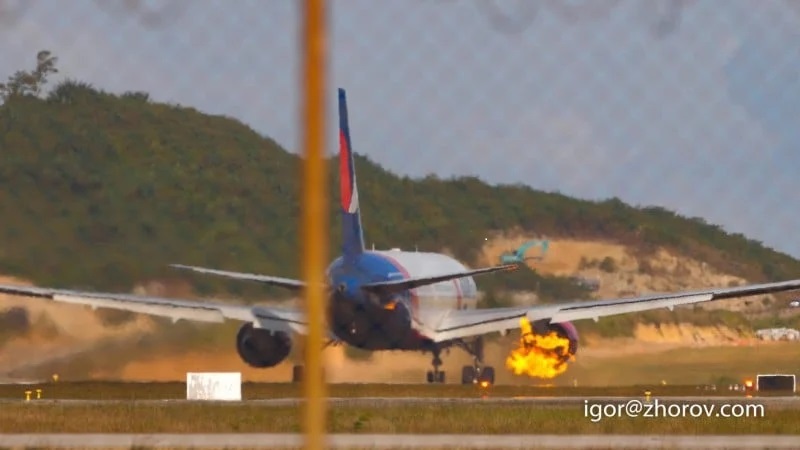
PHUKET: A retired expat with 50 years’ experience in the aviation industry has suggested that an ‘engine surge’ was the most likely cause of the Incident that saw a fully loaded flight bound for Moscow abort takeoff at Phuket International Airport last Saturday (Feb 4).
Azur Air Flight ZF3774 was heading down the runway at about 5pm when flames and smoke were seen coming from the right engine.
The pilot aborted takeoff, but with the aircraft already approaching takeoff speed, he had to brake heavily to bring the Boeing 767-300ER to a shuddering halt.
All 309 passengers and 12 cabin crew on board were safely evacuated from the aircraft. No people were reported injured in the incident.
The Phuket Info Center in its ‘preliminary report’ said that a fire started in one of the engines, which was followed by two “explosions”, or at least the sound of two “explosions”.
The pilot took quick action and activated the fire-suppression system, which cut the fuel supply to the engine.
“At the same time, the engine has already reached a certain speed. The pilot had to brake quickly, causing the brakes to heat up and smoke to rise from the wheels… Some of the tyres ‘broke’ [sic],” PIC reported.
The Special Affairs and Public Relations Division, Administration Department, at Phuket Airport, later confirmed that the braking system on the wheels on the right side of the aircraft had suffered damage.
It took about 40 minutes to move the aircraft off the runway, and when the aircraft was on the taxiway it could not be moved further.
The aircraft blocking the taxiway obstructed other aircraft from taking off or landing while repairs were made to the aircraft.
The obstruction of the taxiway resulted in delays in aircraft arriving to land at the airport. Some aircraft were kept in holding patterns, some were flown to Krabi airport and Suvarnabhumi Airport. In total 16 airlines were affected, the Phuket airport announcement said.
The PIC had earlier reported that 47 flights in total were affected by the delays.
Repairs made to the aircraft while sitting on the taxiway were completed at 00:10 Sunday (Feb 5), allowing the aircraft to be moved out of the taxiway at 00:30, Phuket airport noted in its announcement.
An investigation was underway into the cause of the incident, Phuket airport assured.
Retired German expat Reinhard Luksch, who lives in Rawai, told The Phuket News that an ‘engine surge’ was most likely the cause of the engine trouble that resulted in the aborted takeoff.
Mr Luksch, from Mühlheim, Hessen, Germany, started his career as an Aircraft Engineer with Lufthansa Technik AG at Frankfurt International Airport. Through the following five decades he specialised in engine and component purchasing for major airlines.
He worked as a Technical Purchasing Agent, Technical Purchasing and Logistics Manager, then as Technical Contracts and Strategic Purchasing Manager for Swiss International Air Lines in Zurich and Head of Technical Logistics at Etihad Airways in Dubai, and Manager (parts and components) at the Emirates Flight Training Academy.
“Video Clips on the net show the right engine no. 2 being affected by ‘surging’ which caused abortion of the take off, which was definitely the right decision,” Mr Luksch said.
“These surges can cause fireballs erupting from the engine in short frequencies causing the loss of power. Some noticeable bangs usually go along with this ‘surging’,” he added.
“‘Surging’ is usually caused by malfunctioning engine bleed and/or compressor guide vane controls and related sensors/bleed valves… A low performing compressor might be also a reason,” he said.
“These high power ‘surges’ can hurt the engine so badly that a change might be required, which may be recommended after high power surges,” Mr Luksch noted.
“The full braking after the aborted takeoff is a consequence as the aircraft being fully loaded at high speed has to be brought to a complete stop on the remaining runway.
“When wheels get too hot they have some ‘fuse plugs’ installed which melt around 300°C to avoid the tyres exploding and causing even more damage… After such full braking action the brakes heat up very quickly and can even glow red by the heat and cause a fire around them.
“So the aircraft likely was affected by some flat tyres, which requires special jacks to lift the aircraft as the axles get too low due to the flat tyres… To arrange all this takes time after such an occurrence,” Mr Luksch said.